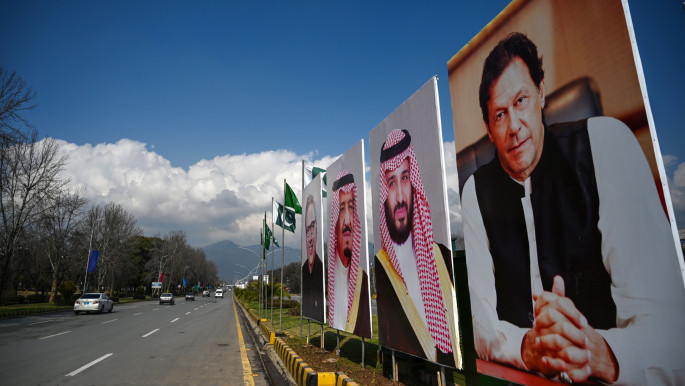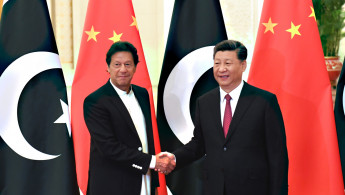What Pakistan's pivot to China means for India-Gulf ties
Pakistan has gradually drifted away from the US following Washington's diminished interest in Afghanistan and has trusted China as a reliable partner in matters related to foreign policy and economy.
But what is remarkable this time is Pakistan's pivot away from Saudi Arabia, arguably Islamabad's strongest international ally, in favour of China.
Deepening strategic ties between India and Gulf countries, in particular Saudi Arabia and the United Arab Emirates (UAE), have prompted Pakistan to move closer to Beijing while chiding its Arab allies.
This rift could have far-reaching implications for the geopolitics of both South Asia and the Middle East, and could drastically change power dynamics in the region.
Could China complicate Gulf-India ties?
At the centre of the shake-up in regional politics has been India's emergence as a major player in the Middle East, at the expense of Pakistan. This geopolitical trend gained momentum when economic diversification efforts by the Saudis and Emiratis brought them closer to India, one of the world's fastest developing economies.
 |
Pakistan has turned away from Saudi Arabia, arguably Islamabad's strongest international ally, in favour of China |  |
Arab countries felt - rightly so – that they had much more to gain from their new friend than their old partner Pakistan. Indo-Arab ties grew at a lightning pace, simultaneously creating a gulf between Pakistan and its Arab partners.
A visit in 2019 by Saudi de facto ruler Mohammed bin Salman (MBS) to New Delhi and Islamabad was a clear manifestation of this geopolitical shift. MBS signed projects worth $20 billion with Pakistan while he offered to invest a staggering $100 billion in India.
 |
|
| How India and China's border face-off could change the contours of Kashmir's conflict |
But the Gulf countries' pivot to India has come at a price. It undermines their balanced foreign policy approach vis-à-vis South Asia, driven by sheer pragmatism and economic interests.
They have long abstained from picking sides in geopolitical issues between India and China, remaining neutral even during the time of bitter clashes between the two Asian giants.
But now there are concerns that Pakistan could use its leverage over China to checkmate the growing strategic partnership between New Delhi and Arab states.
Alarmed by this prospect, India has been keenly observing the unprecedented tensions between Pakistan and Saudi Arabia and anticipating what role China might play in the unfolding rift.
Pakistan has heavily relied on China to amplify its voice on the international stage and Beijing has been more than willing to forge an alliance with anyone who wants to counter India.
 |
Pakistan has heavily relied on China to amplify its voice on the international stage, with Beijing more than willing to forge an alliance with anyone who wants to counter India |
 |
On the contrary, Pakistan has never looked to Saudi Arabia in foreign policy matters primarily due to its detachment from the region. Given its ruthless habit of pursuing an assertive agenda, it will not be a surprise if China agrees to nudge Saudi Arabia on the issue of Kashmir in order to snub India.
Beijing has endorsed Pakistan's stance on Kashmir at the international level, including the UN, on several occasions despite coming under fire for its own human rights violations against Muslims in the western region of Xinjiang.
China has also publicly called out India over the latter's military movements along the Pakistan border even as New Delhi and Beijing are entangled in a separate border standoff.
Elephant or dragon?
So who will Arab countries side with if they face the prospect of being sandwiched between India on one side and Pakistan and China on the other?
 |
|
| Read more: Could Saudi Arabia be parting ways with Pakistan? |
Saudi Arabia and the UAE have several reasons to prioritise their strategic partnership with China more than their newfound love for India. While annual trade between India and the Gulf Cooperation Council (GCC) countries stands at around $120bn, GCC-China bilateral trade is worth more than $170bn.
China is Saudi Arabia's largest and the UAE's second-largest trading partner and both countries have been given the highest category – the "comprehensive strategic partnership" – by China's Communist Party.
Such deep inroads by China in the Gulf should be a cause of worry for India. The India-Gulf relationship has fallen short of expectations on several occasions and the coronavirus outbreak has put a break on booming bilateral economic cooperation, leading to the postponement of some key projects.
However, New Delhi can take solace in the fact that while the China-Gulf partnership is driven by oil and economic interests, a core element of its engagement with the Middle-East has been cultural, with an eight million-strong Indian diaspora in the Gulf forming a solid foundation for bilateral ties.
 |
India has been keenly observing the tensions between Pakistan and Saudi Arabia to anticipate what role China might play in the unfolding rift |
 |
Tricky balancing act
For the moment, Pakistan's relations with China and Saudi Arabia do not present significant challenges. But sooner or later it would be forced to assess the value and risks attached to its ties with these countries.
From Pakistan's point of view, it can reap geopolitical as well as financial benefits from forging close ties with China. Beijing has offered its unwavering diplomatic support for Pakistan at several international forums and invested billions of dollars in the form of Belt and Road Initiative projects in the country.
 |
|
| Read more: China's changing oil strategy in the Middle East |
Saudi Arabia has made unmatched financial contributions to Pakistan but it pales in comparison on the diplomatic front. Pakistan understands very well that aid from Saudi Arabia comes with strings attached but it has always remained loyal to the kingdom, reciprocating in the form of military training and nuclear cooperation.
It even provided diplomatic support to MBS when he was shunned by his allies following the killing of journalist Jamal Khashoggi.
Pakistan's current rage and disappointment are thus justified because the Saudis have repeatedly ignored Pakistani requests for help on Kashmir, perhaps the most important pillar of Islamabad's foreign policy.
But an escalation of the current tension is not in the best interests of either Pakistan or the Middle East. Ditching Riyadh would not only strip Pakistan of a major cash cow. It would also endanger the future of millions of Pakistanis working in the Gulf countries.
Meanwhile, parting ways with Pakistan would be suicidal for the kingdom as the former could turn to its rivals Turkey, Iran and Qatar in a tit-for-tat response to the deepening cooperation between Riyadh and New Delhi.
Pakistan almost did that last year when it stopped short of attending an Islamic summit held by Saudi rivals in Kuala Lumpur, widely seen as an attempt to challenge Riyadh's leadership of the Muslim world.
A more worrying scenario for the Saudis would be if Islamabad trumpets the importance of a Pakistan-Iran-China alliance formed for the successful implementation of China's ambitious Belt and Road projects in the region.
Shan. A. Zain is a journalist and writer based in New Delhi, covering foreign policy and international security issues in Asia and the Middle East.
Follow him on Twitter: @shaan_zain



